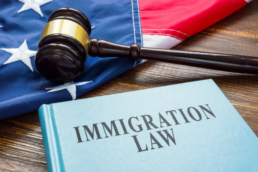Obtaining permanent residency through a family member is a multi-step process.
- First, an immigrant visa petition must be filed. Form I-130 is a Petition for Alien Relative. It is filed by the sponsoring relative for the immigrating beneficiary.
- U.S. Citizenship and Immigration Services will either approve or deny the petition.
- If the I-130 petition is approved, the beneficiary must then wait for a visa number to become available. If a visa number is available, the beneficiary can apply to have an immigrant visa number assigned through the process of Adjustment of Status (for individuals already in the U.S.) or at a U.S. Consulate abroad. In some instances, visa numbers are considered “current.” That means that the beneficiary can file for AOS at the same time as filing Form I-130. This is known as concurrent filing.
Eligibility
In order for a relative to sponsor you to immigrate to the United States, he/she must meet the following criteria:
- The person must be a citizen or lawful permanent resident of the U.S. and be able to provide documentation providing that status; and
- He/she must establish financial support of the immigrating relative at 125% above the mandated poverty line, by filling out an Affidavit of Support (Form I-864).
A sponsoring relative can be a U.S. Citizen or a Lawful Permanent Resident:
- If the sponsor is a U.S. Citizen, the sponsor may petition for the following foreign national relatives to immigrate to the U.S:
- Husband or wife;
- Unmarried child under 21 years old;
- Unmarried child over 21 years old;
- Married son or daughter of any age;
- Brother or sister, if the sponsor is at least 21 years old, or
- Parent, if the sponsor is at least 21 years old.
- If the sponsor is a Lawful Permanent Resident, the sponsor may petition for the following foreign national relatives to immigrate to the U.S.:
- Husband or wife, or
- Unmarried son or daughter of any age.
Whether the sponsor is a U.S. Citizen or permanent resident, proof of familial relationship must be established.
Preference Categories
People who want to become immigrants are classified into categories based on a preference system. Immigrant Visa Numbers are allocated according to these Preference Categories. The immediate relatives of U.S. citizens (parents, spouses and unmarried children under the age of 21), do not have to wait for an immigrant visa number to become available once the visa petition filed for them is approved by USCIS.
The relatives in the remaining categories must wait for an immigrant visa number to become available according to the following preferences:
- First Preference: Unmarried, adult sons and daughters of U.S. citizens. Adult means 21 years of age or older.
- Second Preference: Spouses of lawful permanent residents, their unmarried children (under 21 years old), and the unmarried sons and daughters of lawful permanent residents.
- Third Preference: Married sons and daughters of U.S. Citizens.
- Fourth Preference: Brothers and sisters of adult U.S. Citizens.
Process
Once USCIS receives a visa petition (Form I-130, Petition for Alien Relative), it will be approved or denied. USCIS notifies the person who filed the visa petition of the petition was approved. USCIS will then send the approved visa petition to the Department of State’s National Visa Center, where it will remain until an immigrant visa number is available. The Center will notify the foreign national when the visa petition is received and again when an immigrant visa number is available. It is important to note that reaching the age of 21, marriage, divorce, or death of a spouse may affect one’s eligibility for an immigrant visa.
The process varies slightly for Forms I-130 concurrently filed with Adjustment of Status.
Page Summary: U.S. Citizens and Legal Permanent Residents can sponsor alien relatives for permanent residency in the U.S.
Ready to have Berardi on your side?
Whether you’re a business looking to hire or a professional hoping to relocate, immigration law can be complicated. But you don’t have to do it alone. Put our experience to work for you.


